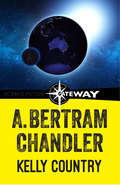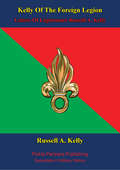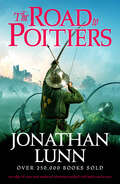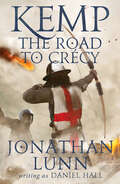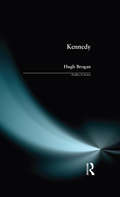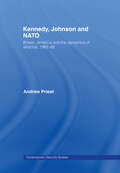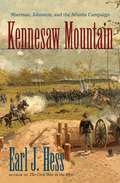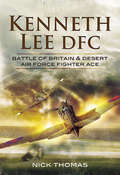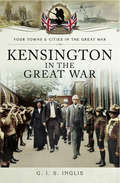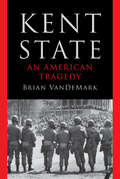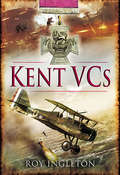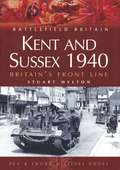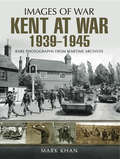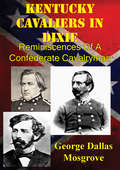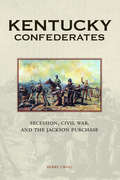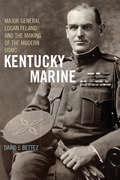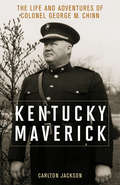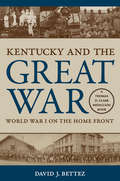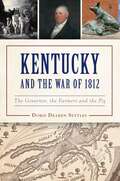- Table View
- List View
Kelly Country
by A. Bertram ChandlerAn If-Of-History Novel The United States won its independence in 1776, and the world has never been the same since. What if Australia had followed suit? How would our world have been different? That's the theme that fascinated A. Bertram Chandler who saw, in the famous Ned Kelly, the possibility of an Australian Washington. For Ned Kelly was not just a lawless bushranger. He was a man of unusual imagination who created his own armor, gathered a band of Irish rebels, and took arms against the frontier law of old Australia. Now, by time machine and calculated interference, a certain 20th Century John Grimes goes back and alters history. Kelly survives! Utilizing the hidden discoveries of science, Kelly helps an Austrailian-Irish Republic rise from Down Under!
Kelly Country
by A. Bertram ChandlerThere was a Ned Kelly. He lived and breathed and fought for what he believed to be right - according to the historians. According to others he was no more than a bushranger, a vicious criminal who paid the just penalty for his crimes on the gallows. But what if he had lived. What would have been the consequences for Australia - and the world?
Kelly Country
by A. Bertram ChandlerThere was a Ned Kelly. He lived and breathed and fought for what he believed to be right - according to the historians. According to others he was no more than a bushranger, a vicious criminal who paid the just penalty for his crimes on the gallows. But what if he had lived. What would have been the consequences for Australia - and the world?
Kelly Country: A John Grimes Novel
by A. Bertram ChandlerAn If-Of-History NovelThe United States won its independence in 1776, and the world has never been the same since. What if Australia had followed suit? How would our world have been different? That’s the theme that fascinated A. Bertram Chandler who saw, in the famous Ned Kelly, the possibility of an Australian Washington.For Ned Kelly was not just a lawless bushranger. He was a man of unusual imagination who created his own armor, gathered a band of Irish rebels, and took arms against the frontier law of old Australia. Now, by time machine and calculated interference, a certain 20th Century John Grimes goes back and alters history. Kelly survives!Utilizing the hidden discoveries of science, Kelly helps an Austrailian-Irish Republic rise from Down Under!
Kelly Of The Foreign Legion - Letters Of Légionnaire Russell A. Kelly
by Légionnaire Russell A. KellyThe French Army have had numerous foreign regiments in its service for centuries; however, few have the mystique and elite status of the French Foreign Legion. It became a haven for the rough, tough, and adventure-seeking crowds of all of Europe. Bred with a fierce and disciplined esprit de corps, these soldiers could expect to fight France's enemies even in the most desperate of circumstances.Like his American compatriot Henry Weston Farnsworth, Russell Kelly enlisted in the French Foreign Legion as soon as possible after the declaration of war was made and the start of the awful slaughter of the First World War began. After a scant two months of training, Kelly recounts that he and his fellow soldiers were shipped off to the Front. Within a mere three months, his letters tell of the vicious and confused fighting that he was involved in around Bouzy and then in the Arras sector. He and his unit were heavily engaged during the battle of Artois and after a short spell of rest and recruitment were back in the frontlines near Souchez, where Legionnaire Kelly met his end.These letters were thought of such quality and interest that they were published in the New York Evening Sun.
Kemp: An edge-of-your-seat medieval adventure packed with battle and action (Arrows of Albion)
by Jonathan LunnTwo kingdoms clash in one of the greatest battles of the Hundred Years War. September 1356. Martin Kemp and his troop of archers ride with the Black Prince’s army as it burns and plunders its way across France. When they find all the bridges across the Loire are destroyed, however, their hopes of uniting with the Duke of Lancaster’s army are dashed, and a hasty retreat is the order of the day. But a French army is closing in fast and Kemp’s old foe, Sir Geoffroi de Chargny, rides with it, now honoured with the duty of bearing the Oriflamme: the sacred war banner of France. Cut off, outnumbered and running out of supplies, the weary English realise their only hope is to risk everything on a pitched battle, and hope the tricks they used ten years earlier at Crécy will pay off a second time, in a field just a few miles outside of Poitiers… A climactic moment in history expertly told by a master of the genre, perfect for fans of Christian Cameron and David Gilman.
Kemp: The Road to Crecy (Arrows of Albion)
by Jonathan LunnAn epic Medieval adventure of the Hundred Years War When Martin Kemp joins the English army in order to avoid the hangman, he may just be delaying the inevitable. While he remains hopeful that at least there’s the chance for some heroics, the reality is very different. Kemp’s war is instead a terrifying odyssey through the panic and confusion of his first battle, the brutal realities of siege warfare, and eventually to the field of Crécy, where he faces the armoured might of the French nobility. But as an elite longbowman, when it comes to winning or losing, he could have a vital – though dangerous – part to play. This stunning adventure brings the medieval world vividly to life, and is ideal for fans of Bernard Cornwell, Matthew Harffy and Giles Kristian.
Ken Follett Omnibus: Eye of the Needle And Whiteout
by Ken FollettEYE OF THE NEEDLE: His weapon is the stiletto, his codename: The Needle. He is Henry Faber, Germany's most feared undercover agent, and a cold and professional killer. His task: to discover the Allies’ plans for D-Day, and get them to Germany at all costs. It's a task he undertakes with customary relish and ruthlessness — until he encounters Storm Island, and a woman called Lucy... WHITEOUT: An injured lab technician, a missing canister. Toni Gallo, the attractive new head of the security team operating at the local pharmaceutical-research company, knows she has problems, but she has no idea of the nightmare to come. As his family converges on a remote farmhouse in Scotland for the Christmas period, Stanley Oxenford is a worried man. Everything is riding on a new drug he’s developed to fight a lethal virus; all have something to gain with the money he’s going to make. Toni Gallo, too, is out to prove herself as a woman up to her job. Then a blizzard whips out of the north, and as the storm worsens, the emotional sparks — jealousies, distrust and sexual attraction — crackle; desperate secrets are revealed; hidden traitors and unexpected heroes emerge.
Kennedy (Profiles In Power)
by Hugh BroganThis invaluable account provides an excellent introduction to the Presidency of John F. Kennedy. To understand Kennedy's aims and achievements in the White House, it looks at Kennedy the man and outlines his background and early career and the influences upon him. Hugh Brogan shows Kennedy as a credible statesman, a man of solid achievement. His record as President was, broadly, impressive and would have been more so had he lived.
Kennedy, Johnson and NATO: Britain, America and the Dynamics of Alliance, 1962-68 (Contemporary Security Studies)
by Andrew PriestKennedy, Johnson and the Defence of NATO is an incisive reassessment of Anglo-American defence relations, which form a crucial part of international security. Andrew Priest closely examines this key relationship by focusing on the so-called Nassau agreement of December 1962. He clearly places Nassau in its context and shows how multi-level collaboration continued between the US and UK in NATO despite growing tensions over American involvement in Southeast Asia and Britain’s global role. Firstly, he shows how agreements made between Presidents and Prime Ministers shape alliances in by encouraging interaction between politicians, government officials and military personnel at various levels of formality. Secondly, by focusing on the NATO area, he assesses US-UK attitudes to European and North Atlantic defence. Traditionally, studies of US-UK relations at this time have tended to concentrate on developing difficulties between Presidents and Prime Ministers (particularly Harold Wilson and Lyndon B. Johnson), over global issues. This study demonstrates the ‘dynamics of alliance’ through a nuanced approach at high-political, official and ‘working’ levels, across different administrations in the US and UK. Although more recently some authors have successfully integrated such a ‘multi-layered’ approach particularly to studies of nuclear affairs, they have tended to treat the 1962 Nassau agreement as something of a dénouement. This book will be essential reading for students of US foreign policy, British foreign policy, Anglo-American relations, European-American relations and the history of NATO.
Kennesaw Mountain
by Earl J. HessWhile fighting his way toward Atlanta, William T. Sherman encountered his biggest roadblock at Kennesaw Mountain, where Joseph E. Johnston's Army of Tennessee held a heavily fortified position. The opposing armies confronted each other from June 19 to July 3, 1864, and Sherman initially tried to outflank the Confederates. His men endured heavy rains, artillery duels, sniping, and a fierce battle at Kolb's Farm before Sherman decided to directly attack Johnston's position on June 27. Kennesaw Mountain tells the story of an important phase of the Atlanta campaign. Historian Earl J. Hess explains how this battle, with its combination of maneuver and combat, severely tried the patience and endurance of the common soldier and why Johnston's strategy might have been the Confederates' best chance to halt the Federal drive toward Atlanta. He gives special attention to the engagement at Kolb's Farm on June 22 and Sherman's assault on June 27. A final section explores the Confederate earthworks preserved within the Kennesaw Mountain National Battlefield Park.
Kenneth Lee DFC: Battle of Britain & Desert Air Force Fighter Ace
by Nick ThomasThe heroic life of the pilot who became an ace with one of the most successful fighter squadrons in the RAF and a captive in a notorious Nazi POW camp. Following training, Lee received his commission and was posted to 501 Squadron which was sent to support the Expeditionary Force in France, arriving on 10 May, only hours after the Blitzkrieg had been launched. Lee quickly opened his score, claiming several bombers during the first week of operations. Having been wounded when his Hurricane exploded following a dogfight, Lee was briefly rested but soon rejoined the Squadron before they moved to their first Battle of Britain base at Middle Wallop. Lee scored more damaged and destroyed enemy aircraft and by the end of July he was Mentioned in Dispatches. Lee was forced to take to his parachute for the second time, learning of the richly deserved award of his DFC while still recovering from his wounds. He later recalled how each of the Squadrons aces, even Ginger Lacey, had been shot down at least twice during that summer. Lee was later posted to 112 (Shark) Squadron, flying Curtis Kittyhawks on Fighter and Fighter-Bomber missions in North Africa and then to 260 Squadron which was heavily involved in the lead-up to the battle of El Alamein, seeking out and destroying enemy troop columns and fighting off the Luftwaffe which still had air superiority. In March 1943, 123 Squadron began Fighter-Bomber operations against Mediterranean targets. During one Lee was hit by AA and made a forced landing in an olive grove. He was captured and sent to Stalag Luft III just in time to play a key role in the Great Escape.
Kensington in the Great War (Your Towns & Cities in the Great War)
by G. I. InglisHow the experience of war impacted on the town, from the initial enthusiasm for sorting out the German kaiser in time for Christmas 1914, to the gradual realization of the enormity of human sacrifice the families of Kensington were committed to as the war stretched out over the next four years. A record of the growing disillusion of the people, their tragedies and hardships and a determination to see it through. The Royal Borough of Kensington was an area of huge contrasts: vast riches in the south, but marked poverty in the north. It was close enough to the heart of London that national and London-wide affairs often impinged on local life, while local residents might have national reputations. Thus enormous crowds attended the interment at Brompton Cemetery of one of Britain's finest air heroes, Sub-Lieutenant Warneford, striking London policemen left an indelible impression as they marched their way through the Borough, while Kensington resident Mrs Dorothy Peel attempted to teach the nation how to make food economies in answer to the submarine threat, but there are also quirky magistrates, stroppy butchers, Mr Bushman the ultra-patriotic cartoon character, dangerous dog-walkers who would sweep your feet from under you in the dark nights and some vivid first-hand accounts such as watching the first Zeppelin come down. The man who turned Kensington into a Borough at war was undoubtedly William Davison (later Sir William) - Kensington's Mayor throughout the war years. He helped complete the local territorial battalion (the 13th Kensingtons), threw his weight behind recruiting a second battalion, and finally raised a Kitchener battalion from scratch, the 22nd Royal Fusiliers, with all their clothing and accoutrements, and even a fully-fitted hutted camp. He was obliged to display enormous organising energy in the in early years and thereafter seemed to be involved in almost everything, from getting food parcels to POWs to serving on Tribunals.We are fortunate that the Mayor left behind 7 volumes of wartime cuttings, while the local Kensington News was an outstanding source
Kensuke's Kingdom (Ks3 Guided Reading Ser.)
by Michael MorpurgoA young boy is stranded on a small island with a mysterious man who shows him how to survive in this adventure story by the acclaimed author of War Horse. When Michael&’s father loses his job, he buys a boat and convinces Michael and his mother to sail around the world. It&’s an ideal trip—even Michael&’s sheepdog can come along. It starts out as the perfect family adventure—until Michael is swept overboard. He&’s washed up on an island, where he struggles to survive. Then he discovers that he&’s not alone. His fellow-castaway, Kensuke, is wary of him. But when Michael&’s life is threatened, Kensuke slowly lets the boy into his world. The two develop a close understanding in this remote place, but the question of rescue continues to divide them. Praise for Kensuke&’s Kingdom&“[A] poignant adventure story . . . This well-crafted story has all the thrills and intrigues of Gary Paulsen&’s Hatchet . . . and Theodore Taylor&’s The Cay . . . and it will resonate with the same audience.&” —School Library Journal&“Highly readable.&” —Booklist
Kent State: An American Tragedy
by Brian VanDeMarkA definitive history of the fatal clash between Vietnam War protestors and the National Guard, illuminating its causes and lasting consequences. On May 4, 1970, at Kent State University in Ohio, political fires that had been burning across America during the 1960s exploded. Antiwar protesters wearing bell-bottom jeans and long hair hurled taunts and rocks at another group of young Americans—National Guardsmen sporting gas masks and rifles. At half past noon, violence unfolded with chaotic speed, as guardsmen—many of whom had joined the Guard to escape the draft—opened fire on the students. Two reductive narratives ensued: one, that lethal state violence targeted Americans who spoke their minds; the other, that law enforcement gave troublemakers the comeuppance they deserved. For over fifty years, little middle ground has been found due to incomplete and sometimes contradictory evidence. Kent State meticulously re-creates the divided cultural landscape of America during the Vietnam War and heightened popular anxieties around the country. On college campuses, teach-ins, sit-down strikes, and demonstrations exposed the growing rift between the left and the right. Many students opposed the war as unnecessary and unjust and were uneasy over poor and working-class kids drafted and sent to Vietnam in their place. Some developed a hatred for the military, the police, and everything associated with authority, while others resolved to uphold law and order at any cost. Focusing on the thirteen victims of the Kent State shooting and a painstaking reconstruction of the days surrounding it, historian Brian VanDeMark draws on crucial new research and interviews—including, for the first time, the perspective of guardsmen who were there. The result is a complete reckoning with the tragedy that marked the end of the sixties.
Kent VCs
by Roy IngletonAs one might expect from a county with the motto 'Invicta' (Unconquered), Kent has produced her fair share of military heroes. Here Roy Ingleton honors 50 of those who have been awarded the nation's highest decoration for valor in the line of duty.The book is divided into sections according to the conflicts in which the awards were earned, each beginning with a concise historical overview to set the context for these acts of heroism. From the Crimea (thus some of the earliest VCs ever awarded), through to the Second World War, the entries encompass many of the most famous episodes in British military history and are drawn from all three services. Meet heroes such as Sergeant Major Wooden of the 17th Lancers and surgeon Sir James Mouat who were granted VCs for their part in the Charge of the Light Brigade (Battle of Balaclava, 1857); Captain Walter Norris Congreve who helped to save the guns at Colenso (1899); Lieutenant Philip Neame, scion of Kent's famous brewing family and the only man to win both an Olympic gold medal and a VC (Neuve Chapelle, 1914); Major James McCudden, the leading British fighter ace of WWI and probably Kent's most famous VC winner (France1917/18); Lieutenant Commander George Bradford RN (Zeebrugge Raid, 1918); Sergeant Thomas Durrant, No 1 Commando (St Nazaire, 1942) and Lance Corporal John Harman (Battle of Kohima, 1944). The nation holds a special place in its heart for winners of the Victoria Cross and this book is sure to inspire not only those who are lucky enough to call Kent home, but anyone interested in British military history.
Kent and Sussex 1940: Britain's Front Line (Battlefield Britain)
by Stuart HyltonIn June 1940, Britain's front line against the German armies was the coast of Kent and Sussex. Across the Channel, Hitler's forces gathered, preparing for invasion, as the Home Forces struggled desperately to recover from the disaster and miracle of Dunkirk. Occupation of these islands was nearer than for almost nine hundred years. Kent and Sussex 1940, tells the story of the communities that found themselves in the front line, placing their experience within the context of huge historic events.
Kent at War 1939–45 (Your Towns & Cities in World War Two)
by Tanya WynnThis comprehensive account of the southern English county during WWII covers everything from the Dunkirk evacuations to the Battle of Britain and more. Located along the English Channel, the southeastern county of Kent played a significant role in the Second World War. This volume covers Kent&’s many contributions—both civilian and military—throughout the conflict. The chronicle details how the Dover Patrol kept Allied shipping safe in the English Channel, as well as the preparation and aftermath of the Dunkirk evacuations of May 1940, with all of the vessels leaving from and returning to Kent ports and harbors. Kent&’s numerous airfields were of vital importance during the Battle of Britain between July and October 1940. The Richborough camp, set up in 1939 at the old First World War Kitchener barracks, provided safe haven to thousands of German and Austrian Jewish refugees. This book includes never before published letters written to one of the camps residents during his stay there. Historian Tanya Wynn also discusses the county's military hospitals and pow camps, it&’s Victorian Cross and George Medal winners, and the restricted areas that adorned the coast as the people of Kent battened down the hatches, knowing that they were the very first line of defense in case of a German invasion.
Kent at War, 1939–1945: Rare Photographs From Wartime Archives (Images of War)
by Mark KhanFollowing on from Blitz on Kent, all aspects of life during the Second World War were experienced during in this embattled county. From the onset of the war Kent became a key part in the front line defence of Britain. Defences were built, and the Home Guard formed.With the threat of invasion receding, the county took part in the great offensive against Nazi Germany. Preparations and training took place that lead to the D-Day invasion in June 1944 and ultimate victory in 1945. This book will tell the story of the story of the County from the very beginning of the war to the end and afterwards, both from civil and military perspectives.Subjects covered are: Invasion defences, Home Guard, Dunkirk, life during wartime, D-Day, German Prisoners of War, the Americans in Kent, The Royal Navy, people and life during wartime, The RAF, soldiers in Kent regiments, training, individual studies, the military on the move: Bren Carriers, Churchill tanks, Covenanter tanks, artillery, Matilda tanks, Valentine tanks, motor bikes, lorries, lease-lend Vehicles, weapons, women in wartime Kent, VE Day and post-war Kent the legacy of the war.
Kentucky Cavaliers In Dixie; Reminiscences Of A Confederate Cavalryman [Illustrated Edition]
by George Dallas MosgroveIncludes more than 20 Illustrations of the author's unit and commanders."George Dallas Mosgrove was born in Louisville, Kentucky, in 1844, and enlisted in the Fourth Kentucky Cavalry Regiment as a private on September 10, 1862. Through service as a clerk and orderly in both regimental and brigade headquarters, he became familiar with the environment of officers and command. His eyewitness account illuminates the western theater of the Civil War in Kentucky, east Tennessee, and southwest Virginia. Mosgrove admits to a romanticism influenced by Sir Walter Scott in his description of the superiority of the officers and "some of the boys" in his regiment. At the same time, his narrative includes unadorned passages that depict with stark honesty the sordidness of war and man's inhumanity. Mosgrove provides firsthand information about military actions at Blue Springs, Saltville, and elsewhere, and relates details of his participation in John Hunt Morgan's Last Kentucky Raid and the skirmish where Morgan was killed. Mosgrove's highly entertaining account is a perceptive and informative retelling of the truth as he saw it."-Print Ed.
Kentucky Confederates: Secession, Civil War, and the Jackson Purchase
by Berry Craig&“This book will become the definitive work on the political, social, and military climate of the Purchase region during the Civil War.&” —Kentucky Libraries During the Civil War, the majority of Kentuckians supported the Union under the leadership of Henry Clay, but one part of the state presented a striking exception. The Jackson Purchase—bounded by the Mississippi River to the west, the Ohio River to the north, and the Tennessee River to the east—fought hard for separation and secession, and produced eight times more Confederates than Union soldiers. Supporting states&’ rights and slavery, these eight counties in the westernmost part of the commonwealth were so pro-Confederate that the Purchase was dubbed &“the South Carolina of Kentucky.&” The first dedicated study of this key region, Kentucky Confederates provides valuable insights into a misunderstood and understudied part of Civil War history. Author Berry Craig draws from an impressive array of primary documents, including newspapers, letters, and diaries, to reveal the regional and national impact this unique territory had on the nation&’s greatest conflict. Offering an important new perspective on this rebellious borderland and its failed bid for secession, Kentucky Confederates will serve as the standard text on the subject for years to come. &“A masterpiece. Long overdue, it chronicles the history of a region of Kentucky that has received little or no attention by historians heretofore. It is my considered opinion Craig&’s book will be the definitive work on his subject for many years.&” —Kent Masterson Brown, author of Meade at Gettysburg
Kentucky Marine: Major General Logan Feland and the Making of the Modern USMC
by David J. Bettez“Follows the changes in the Marine Corps from its role as colonial infantry to amphibious assault force . . . us[ing] the career of Maj. Gen. Logan Feland.” —Allan R. Millett, author of Semper FidelisWinner of the Marine Corps Heritage Foundation’s Colonel Joseph Alexander AwardA native of Hopkinsville, Kentucky, Major General Logan Feland (1869-1936) played a major role in the development of the modern Marine Corps. Highly decorated for his heroic actions during the battle of Belleau Wood in World War I, Feland led the hunt for rebel leader Augusto César Sandino during the Nicaraguan revolution from 1927 to 1929—an operation that helped to establish the Marines’ reputation in guerrilla warfare and search-and-capture missions. Yet, despite rising to become one of the USMC’s most highly ranked and regarded officers, Feland has been largely ignored in the historical record.In Kentucky Marine, David J. Bettez uncovers the forgotten story of this influential soldier of the sea. During Feland’s tenure as an officer, the Corps expanded exponentially in power and prestige. Not only did his command in Nicaragua set the stage for similar twenty-first-century operations in Iraq and Afghanistan, but Feland was one of the first instructors in the USMC’s Advanced Base Force, which served as the forerunner of the amphibious assault force mission the Marines adopted in World War II.Kentucky Marine also illuminates Feland’s private life, including his marriage to successful soprano singer and socialite Katherine Cordner Feland, and details his disappointment at being twice passed over for the position of commandant. Drawing from personal letters, contemporary news articles, official communications, and confidential correspondence, this long-overdue biography fills a significant gap in twentieth-century American military history.
Kentucky Maverick: The Life and Adventures of Colonel George M. Chinn
by Carlton Jackson&“An absorbing story about how the Lincoln veteran George Watt managed to escape from Nazi-occupied Belgium.&”—San Francisco Review of Books November 1943: American flyer George Watt parachutes out of his burning warplane and lands in rural Nazi-occupied Belgium. Escape from Hitler&’s Europe is the incredible story of his getaway—how brave villagers spirited him to Brussels to connect with the Comet Line, a rescue arm of the Belgian resistance. This was a gravely dangerous mission, especially for a Jewish soldier who had fought against Franco in the Spanish Civil War. Watt recounts dodging the Gestapo, entering Paris via the underground, and finally, crossing the treacherous Pyrenees into Spain. In 1985, he returned to Belgium and discovered an astonishing postscript to his wartime experiences. &“A story of what is best in human beings triumphing over what is worst.&”—John Sayles, author of Yellow Earth &“One of those rare little narratives that engage the reader from the first page to the last . . . It is about the human spirit and those willing to risk their lives for a stranger.&”—Library Journal "A hell of an adventure story."―Ring Lardner, Jr., author of The Ecstasy of Owen Muir &“This is one of my favorite books about World War II, and the first I have read that is about the Comet Line and the people who helped with running it.&”—Armchair Interviews &“This is an interesting and exciting account that provides a first-person examination of the plight of an individual airman, and insights into the scope, risks, and techniques of the Belgian and French underground movements.&”—Col. Stetson M. Siler, USAF (Ret.)
Kentucky and the Great War: World War I on the Home Front (Topics in Kentucky History)
by David J. BettezThe award-winning author of Kentucky Marine “has crafted an excellent account of how World War I impacted Kentucky socially, economically, and politically” (Journal of America’s Military Past).From five thousand children marching in a parade, singing, “Johnnie get your hoe . . . Mary dig your row,” to communities banding together to observe Meatless Tuesdays and Wheatless Wednesdays, Kentuckians were loyal supporters of their country during the First World War. Kentucky had one of the lowest rates of draft dodging in the nation, and the state increased its coal production by 50 percent during the war years. Overwhelmingly, the people of the Commonwealth set aside partisan interests and worked together to help the nation achieve victory in Europe.David J. Bettez provides the first comprehensive analysis of the impact of the Great War on Bluegrass society, politics, economy, and culture, contextualizing the state’s involvement within the national experience. His exhaustively researched study examines the Kentucky Council of Defense—which sponsored local war-effort activities—military mobilization and preparation, opposition and dissent, and the role of religion and higher education in shaping the state’s response to the war. It also describes the efforts of Kentuckians who served abroad in military and civilian capacities, and postwar memorialization of their contributions. Kentucky and the Great War explores the impact of the conflict on women’s suffrage, child labor, and African American life. In particular, Bettez investigates how black citizens were urged to support a war to make the world “safe for democracy” even as their civil rights and freedoms were violated in the Jim Crow South. This engaging and timely social history offers new perspectives on an overlooked aspect of World War I.
Kentucky and the War of 1812: The Governor, the Farmers and the Pig (Military)
by Doris D. SettlesHow the Bluegrass State Helped Win a War While not a single battle of the War of 1812 was fought on Kentucky soil, Kentuckians were involved to the very end. Henry Clay and his War Hawks convinced Congress and President Madison to declare war, and helped negotiate the Treaty of Ghent that ended it. After two massacres of Kentucky militia on the Northwestern front, Governor Isaac Shelby, still the only sitting governor to lead troops into battle, more than 4,000 locals and a pig marched to Canada to defeat the British and kill Tecumseh at the Battle of the Thames. Author Doris Dearen Settles explains how Kentuckians won the war of 1812 and why it is far more significant than textbooks record.

